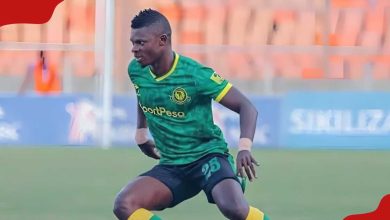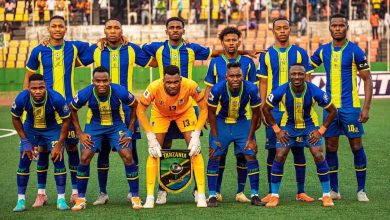Dreaming of the cup, not the venue and Simba ‘delivers’ it by the Zanzibar tide

IN a dream so vivid, I found myself swept into an epic Simba SC fairytale—one spiked with drama, betrayal, absurdity and the kind of chaos that only Tanzanian football can deliver.
It all began when I dreamt I am in Morocco, where Simba SC, the pride of Msimbazi, pulled off what many called the miracle of Berkane.
In a continent where an away draw is as rare as a boda boda that obeys traffic lights, somehow Simba SC managed to hold RS Berkane to a thrilling 1-1 draw.
Jean Charles Ahoua flew down the wings like a man possessed, Ateba threaded midfield passes with the elegance of a Kinondoni salsa instructor.
And Mukwala haunted the Moroccan defence like a ghost who knows your PIN number.
Berkane, heavily favoured at home, were left dazed, confused and Googling “what just happened?” in French. The Simba camp erupted in joy. Back in Dar es Salaam, bars overflowed.
A butcher in Kariakoo promised free nyama choma for every goal Simba scored in the second leg.
TikTokers went wild, remixing chants into amapiano beats.
The red tide was rising. All roads pointed to Benjamin Mkapa Stadium for the historic second leg and the nation was ready to turn up.
Enter Gerson Msigwa, government spokesperson extraordinaire, who called a press conference that felt more like a state address.
Wearing a sharp suit and a look of supreme confidence, he declared before the Almighty and the Republic that the Benjamin Mkapa Stadium was “100 pe cent ready for any fixture.
“Even if the new Pope, Messi and Beyoncé want to perform simultaneously, we’re good.” The public exhaled. If Msigwa swore, it must be gospel.
Simba players landed in Dar like returning war heroes. Airport staff formed a tunnel of honour. Journalists shoved each other for soundbites.
“We’re not done,” said Coach Fadlu Davids. “We’re not even halfway. We kept our balance. Now we attack.”
His face radiated the calm confidence of a man who knew he had a date with destiny.
Then the dream twisted. It began with a quiet news ticker on TV: “CAF yet to confirm Mkapa Stadium for final.”
People shrugged. Just protocol, right?
Then came a louder bulletin: “CAF raises concerns over renovations.”
People paused.
Then, like a thunderbolt, came the dagger: “The final will not be held at Mkapa. Venue has been shifted to Amaan Stadium, Zanzibar.”
Dar went silent.
It felt like finding out your wedding venue has been double-booked by a funeral.
Kariakoo froze mid-shuffle. A Simba fan in Sinza fainted while brushing his jersey.
Meme factories switched from “Simba Champions 2025” to “Simba exiled to the Isles.”
Social media went into full panic mode. “But Msigwa said…!” screamed one fan.
Another wrote, “We believed you, bro. You broke us like Wi-Fi during a Zoom interview.”
The Simba management team tried damage control.
Media officer Ahmed Ally called from Morocco sounding like a man who had just discovered that his favourite sufuria was being used as a plant pot.
“Yes, we’ve received the information,” he admitted. “But our focus is still on the game.”
Which game? Which planet? The fans weren’t buying it.
Not when they had already printed shirts that said “Kwa Mkapa Tuliua Berkane 25/05/2025.”
The dream showed me a government crisis meeting. Ministers pacing. Phones ringing.
One official suggested moving the game to a Chinesebuilt stadium in Dodoma.
Another countered, “Why not Jamhuri ya Morogoro?”
Someone even proposed playing at the Tanzanite football pitch in Manyara.
It was absurd, like watching Parliament debate the proper way to boil eggs.
Eventually, all fingers pointed to the Isles. Amaan Stadium was clean, beautiful and recently blessed by Dr Mwinyi himself.
It had hosted Simba before, it had modern stands and above all—it was available.
The only problem? It wasn’t Dar. And Dar’s entire ego was now built on this being the city where Simba conquers Africa.
Still, Simba had no choice. And so, the exodus began.
The dream showed ferry lines longer than passport queues at Julius Nyerere Airport. Simba fans in red jerseys piled onto boats like pilgrims.
One woman brought her chicken for luck. Another fan, wearing a Kibu Denis jersey and flip-flops with the words “Finali ni Yetu,” danced barefoot across the deck.
An entire busload of fans from Mbagala sang war songs and debated where to sleep in Zanzibar.
“Even if we have to sleep at Forodhani Gardens, tutalala na kombe mkononi,” said one.
In Zanzibar, the red sea landed like a biblical invasion. Hotels were overbooked. Bajaj drivers inflated their rates with zero shame.
Someone offered tent spaces for fans in Mnazi Mmoja at 15,000/- per night, breakfast not included.
Touts offered fake tickets faster than you could say “CAF.”
On game day, the dream escalated.
The stadium overflowed with colour. Fans with painted faces. Drummers who hadn’t blinked since morning. Aunties ululating with the passion of ten weddings.
Even goats dressed in Simba jerseys were brought in for “spiritual support.”
A man from Magomeni proudly displayed a tattoo of Mukwala kicking a Berkane head.
Berkane arrived looking confused.
One of their midfielders was heard asking, “What is this place? Why does it smell like Zanzibar pizza and firecrackers?”
Simba, meanwhile, looked at home. They trained like warriors. Ateba warmed up with his eyes closed, listening to taarab.
Kibu Denis nodded like a man ready to avenge all his childhood punishments.
The match began. The dream didn’t give exact goals. It only showed action—Kibu sliding, Mukwala chasing, Inonga Bacca clearing like Moses parting the Red Sea.
The crowd roared with every touch.
A fan fainted out of excitement after a corner kick. When the final whistle blew, the roar was heard all the way to Pemba.
Simba were champions. Not in Dar. Not in Kariakoo. But in Zanzibar.
It was poetic and ridiculous. A mainland team, exiled by fate, lifted their first-ever continental trophy on foreignbut-still-home soil.
Amaan erupted. Simba fans cried, screamed, danced, hugged strangers and gave each other nicknames like “Commander Kibu” and “General Ateba.”
One man from Buguruni, now shirtless and shoeless, walked straight into the ocean.
“I told them,” He screamed. “Even if it’s the moon, Simba will win!”
Coach Davids cried. The kind of tears you hide with sunglasses but still leak through.
“This team,” he whispered to reporters, “they didn’t just play. They believed.”
Ahmed Ally wrote a Facebook post with no punctuation and 73 emojis.
Meanwhile, Yanga fans watched from a safe emotional distance.
Some tried to downplay it. “Let them celebrate. Even Arusha United can win if you move the game to Mars.”
Others retreated completely from the internet. One fan was spotted deleting all Simba-related friends from his WhatsApp.
Another simply posted a black square and said, “Unavailable until 2026.”
The dream ended with national celebrations. A public holiday was declared.
Pilau was distributed in classrooms. A road in Kariakoo was renamed “Mtaa wa Ushindi.” Musicians rushed to record victory anthems.
One man vowed to name his next three children Simba, Mukwala and Zanzibar.
As I woke up, I found myself laughing.
Not just at the absurdity of it all, but at the perfect mess that is Tanzanian football.
Where dreams are stitched with sweat, drama is part of the kick off and even when the stadium betrays you—victory can still be found on an island across the sea.
In the end, Simba didn’t just win the cup. They won the story. And in this country, the story is everything





